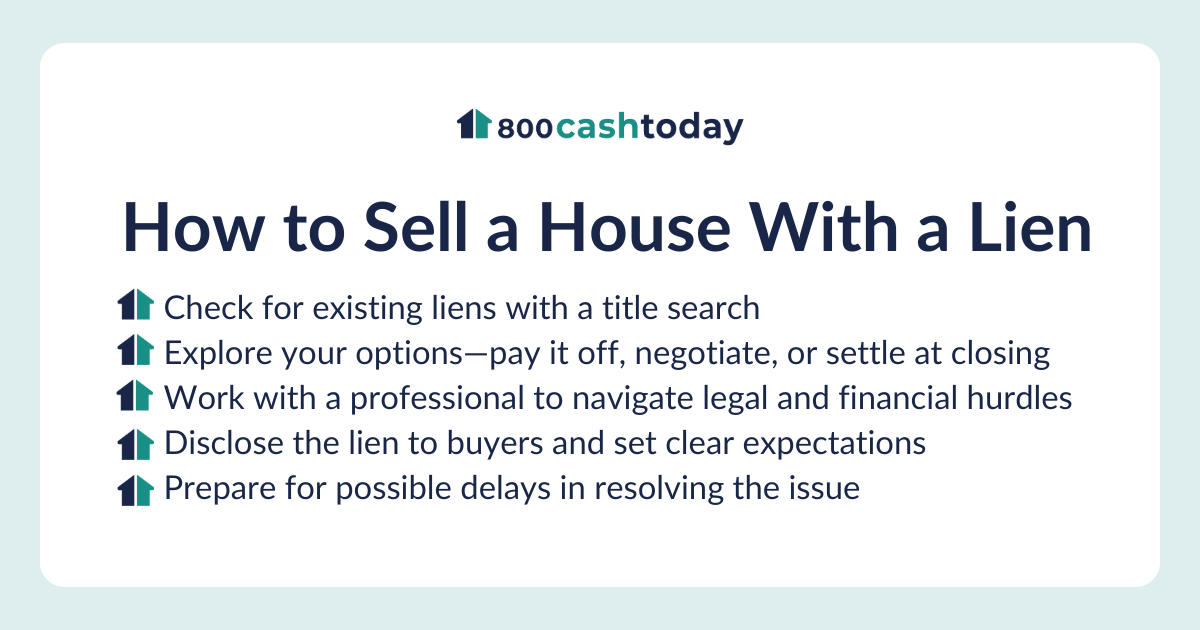Recent Posts
- Is Home Staging Worth It? March 25 2025
- What Is the Difference Between Estate Tax and Inheritance Tax? March 24 2025
- How to Sell Your House Fast in Austin, TX March 11 2025

Selling a house can be stressful on its own, but if your home has a lien on it, the process becomes even more complicated.
So, can you sell your house with a lien? The short answer is yes, but you’ll need to resolve the lien in some way before the sale can proceed.
Whether the lien is from unpaid taxes, contractor work, or a court judgment, there are ways to move forward. Below, we’ll break down what a lien is, how it affects a home sale, and the steps to selling a home with a lien.
A lien is a legal claim placed on a property due to unpaid debts, preventing the homeowner from transferring a clean title until the debt is settled.
While liens protect creditors by ensuring repayment and, in some cases, can be negotiated or settled for less than the full amount, they can complicate the home-selling process. A lien can lower a property’s value, deter buyers, and require extra paperwork or legal action to resolve.
Property liens can come from various sources, but they generally fall into two categories: voluntary liens (like a mortgage) and involuntary liens (placed without the owner’s consent).
When selling a house with a lien, the biggest challenge is that the lien will appear in a title search, alerting buyers and lenders to the debt attached to the property.
Many buyers are hesitant to purchase a home with an active lien, as it can create legal and financial complications. In most cases, the lien must be resolved before closing, either by paying it off, negotiating a settlement, or using the home sale proceeds to cover the debt.
Additionally, some liens, such as tax liens or judgment liens, can result in legal action if left unpaid, further complicating the sale.
While liens can delay the process and limit buyer interest, they don’t necessarily make selling your home impossible—understanding your options and addressing the issue early can help facilitate a smoother transaction.

Selling a house with a lien requires careful planning and a clear strategy, but it is possible with the right approach.
Whether the lien is due to unpaid taxes, contractor fees, or a legal judgment, resolving or negotiating the debt before closing is essential to ensure a smooth transaction.
Before listing your home, it is important to confirm whether a lien exists by conducting a title search. You can check with your county recorder’s office, order a report from a title company, or review any outstanding notices from creditors. Identifying the lien early allows you to understand its impact and determine the necessary steps to resolve it.
Once you confirm a lien exists, decide how to handle it:
Selling a home with a lien can be complex, so it is beneficial to work with an experienced real estate attorney.
A professional can help you navigate the legal and financial aspects of the lien, communicate with creditors, and ensure that the title is cleared before closing. They can also guide you on how to disclose the lien to potential buyers and structure the sale in a way that minimizes delays.
When selling a home with a lien, it is important to disclose the issue to potential buyers early in the process. Many buyers may be hesitant to proceed if they discover the lien later, which could cause delays or cancellations.
By being upfront, you can reassure buyers that you are actively resolving the issue and provide a clear plan for how it will be handled before closing. Transparency builds trust and increases the likelihood of a successful sale.
The process of resolving a lien can take time, so it is essential to plan for possible delays in the sale. Negotiating with lienholders, filing the necessary paperwork, and waiting for legal clearance can extend the timeline.
To prevent unnecessary setbacks, start the process as early as possible and maintain clear communication with all parties involved. Being proactive can help ensure that the sale proceeds smoothly despite the initial challenges posed by the lien.

Is it legal to sell a property with a lien?
Yes, but the lien must usually be settled before the sale closes.
How do you know if your property has a lien on it?
Check with your county recorder’s office, order a title search, or review any past-due notices from creditors.
How long does a lien stay on a property?
It depends on the type of lien. Some expire after a few years, while others last until they are paid or legally removed.
Is it hard to sell a house with a lien?
It can be challenging, as most buyers and lenders require a clear title. However, paying off or negotiating the lien can make the sale possible.
Do liens have to be paid before closing?
In most cases, yes. Liens are typically settled before or at closing using the home sale proceeds.
What are the disadvantages of a lien on your property?
A lien can make selling or refinancing more difficult, lower your property value, and cause delays. However, resolving the lien through payment or negotiation can help you move forward with a successful sale.
If you’re dealing with a lien and need to sell your house quickly, 800CashToday can help. Instead of navigating the lengthy process of paying off liens and waiting for traditional buyers, you can get a fast, hassle-free cash offer for your home in any condition.
Our team understands the challenges of selling a property with financial obstacles, and we work with homeowners to find solutions that allow for a smooth and stress-free sale.
Skip the delays, avoid costly repairs, and get the cash you need—contact 800CashToday for a no-obligation offer!